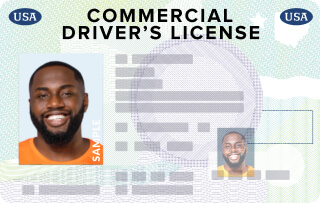- Updated for March 2025
- Based on 2025 CT commercial driver's license manual
Free Connecticut CDL Permit Practice Test: General Knowledge 2025
We bet we know why you’re here: You need to pass the official General Knowledge test on commercial driving theory. You’ve been studying the official Connecticut Commercial Driver License Manual (Connecticut CDL Handbook 2025) because you know the knowledge test is based on it. But after you looked at the manual, you felt you could use some more help to be sure of passing the knowledge test. Great! That’s just what we do. We’ve helped thousands of aspiring drivers pass their knowledge tests, and we can help you too.
This free Connecticut CDL permit practice test is also based on the official manual and is up to date as of March, 2025. Practicing with it will reinforce your knowledge and identify topics you need to study further. Each of the 50 practice questions comes with a helpful hint and an explanation of the correct answer. The practice questions contained in this test will assess your knowledge of such topics as basic driving skills, cargo management, emergency preparedness, following distance, and pre-trip inspections. We have other General Knowledge practice tests on other topics too. Keep practicing with them until you feel ready to take the official General Knowledge test.
Passing the General Knowledge test is a big step – but only one step – toward obtaining a Commercial Driver’s License (CDL). By passing a medical examination and meeting a few other requirements, you’ll become eligible for a Commercial Learner’s Permit (CLP). It takes a lot of driving practice to become proficient at commercial driving. Your CLP will legally allow you to practice commercial driving under the supervision of a CDL holder. Once you become good at commercial driving, you will be ready to take the skills test for a CDL.
With your CDL in hand, you shouldn’t have trouble finding work as a commercial driver in Connecticut. The agricultural sector depends on truckers to transport its products. Manufacturing, largely in defense and aerospace, is the third-largest economic sector in the state. These high-tech firms depend on truckers to deliver equipment and materials to them as well as transport products. Another major economic sector in Connecticut is tourism, which employs bus drivers to transport visitors, especially to and from the state’s casinos.
The most important trucking route in Connecticut is Interstate 95, which runs along the coast between New York City and Rhode Island but which is notorious for traffic jams during rush hours. Other important commercial routes are Interstate 84, which connects Danbury to Hartford; and U.S. Route 7, which runs northward from Norwalk to Danbury and then to the Massachusetts border.
- Perfect for first-time and renewal CDL/CLP applicants, and those adding endorsements
- Triple-checked for accuracy
What you need to know

What to expect on the actual CT DMV exam
questions
correct answers to pass
passing score
List of questions (classic view)
- What can you do at an accident scene to help avoid another accident?
- What is a common cause of tire fires?
- Which is NOT one of the four basic skills that operating a commercial motor vehicle requires?
- An antilock braking system (ABS) will
- On wet roads, you should reduce your speed by
- What might happen if you swing wide to the left before you turn right?
- How can you determine if your vehicle is equipped with an antilock braking system (ABS)?
- How many tie-downs are required for a 20-foot load?
- Hazardous materials placards are
- You should put the starter switch key into your pocket while you perform the pre-trip inspection because
- Total stopping distance equals
- Starting the engine and inspecting the cab involves each of the following tasks EXCEPT
- What will help a drunk sober up?
- To help you stay alert and safe while driving, you should
- In which of the following two situations should you downshift?
- As part of your basic control skills test, the examiner will ask you to perform a Reverse Offset Backing maneuver (i.e., offset back your vehicle and park it at the end of an alley). You must bring the rear of your vehicle within ________ of the rear of the alley without touching boundary lines or cones.
- The minimum tire tread depth for front tires is
- Which of these is NOT part of the basic method for shifting up?
- The most important hand signal that you and a helper should agree on is
- Do empty trucks have the best braking?
- If you double your speed, how much more distance will it take to brake to a stop?
- When you start to drive down a steep downgrade, which of the following should influence your choice of speed?
- Which of the following statements about retarders are correct?
- If the engine is not overheated, is it completely safe to remove the radiator cap?
- Before transporting a sealed load, you must check
- You must park on the side of a level, straight, undivided two-lane road. Where should you place your reflective triangles?
- You should inspect wheel bearing seals for
- If you are confronted by an aggressive driver, what should you do?
- Why is it important to use a helper when backing?
- How long will you lose your CDL driving privileges if you are convicted of a second DUI offense in either a CMV or your private vehicle?
- Always try to back toward the driver's side because
- What is the best way to figure out how many seconds of following distance you have?
- Why should you cover your cargo?
- To maintain alertness on your trips, you should
- What is gross vehicle weight (GVW)?
- Which of the following is NOT something you should check during a trip?
- What is the definition of a hazard?
- Letting the air out of hot tires
- While driving at night, which lights should you use as often as you can?
- How often must you stop to check your cargo while on the road?
- On which of the following types of fires should you NOT use a B:C fire extinguisher?
- During your pre-trip test, when examining hoses with the instructor, you need to look for
- Which of the following is a key steering component?
- How can you start moving without rolling backward?
- Which of the following should you NOT do if you experience a tire failure?
- If you are traveling at 55 mph in a 30-foot vehicle, you should leave how many seconds of following distance?
- To transport cargo safely, which of these are you NOT responsible for?
- It has just reached freezing. Which of the following areas may be slippery?
- How long does it take a typical tractor-trailer to clear a double railroad track?
- You don't want to be a distracted driver, so you
FAQs
What are the requirements?
To obtain a CDL in Connecticut, you need to get a commercial learner's permit (CLP) by passing knowledge tests. Hold the CLP for at least 14 days before taking the skills test. Additionally, you must meet age, medical, and residency requirements. CDL training, while not mandatory, is highly recommended for preparation.
What is the associated cost?
The cost for a CDL in Connecticut includes a $10 fee for the knowledge test and a $30 fee for the skills test. The CDL itself costs $70. Additional costs for training programs vary by provider.
How long does training last?
CDL training duration in Connecticut varies depending on the program. Full-time training typically lasts several weeks, while part-time training may take longer.
What is the minimum age required?
You must be at least 18 years old to obtain a CDL in Connecticut for intrastate driving. For interstate driving or to transport hazardous materials, you must be 21 years old.
What defines a commercial vehicle in the state?
In Connecticut, a commercial vehicle is defined as any motor vehicle used to transport goods or passengers for hire, with a Gross Vehicle Weight Rating (GVWR) of 26,001 pounds or more, designed to transport 16 or more passengers including the driver, or used to transport hazardous materials requiring placarding.
- Alabama: Test 1 / Test 2
- Alaska: Test 1 / Test 2
- Arizona: Test 1 / Test 2
- Arkansas: Test 1 / Test 2
- California: Test 1 / Test 2
- Colorado: Test 1 / Test 2
- Connecticut: Test 1 / Test 2
- Delaware: Test 1 / Test 2
- District of Columbia: Test 1 / Test 2
- Florida: Test 1 / Test 2
- Georgia: Test 1 / Test 2
- Hawaii: Test 1 / Test 2
- Idaho: Test 1 / Test 2
- Illinois: Test 1 / Test 2
- Indiana: Test 1 / Test 2
- Iowa: Test 1 / Test 2
- Kansas: Test 1 / Test 2
- Kentucky: Test 1 / Test 2
- Louisiana: Test 1 / Test 2
- Maine: Test 1 / Test 2
- Maryland: Test 1 / Test 2
- Massachusetts: Test 1 / Test 2
- Michigan: Test 1 / Test 2
- Minnesota: Test 1 / Test 2
- Mississippi: Test 1 / Test 2
- Missouri: Test 1 / Test 2
- Montana: Test 1 / Test 2
- Nebraska: Test 1 / Test 2
- Nevada: Test 1 / Test 2
- New Hampshire: Test 1 / Test 2
- New Jersey: Test 1 / Test 2
- New Mexico: Test 1 / Test 2
- New York: Test 1 / Test 2
- North Carolina: Test 1 / Test 2
- North Dakota: Test 1 / Test 2
- Ohio: Test 1 / Test 2
- Oklahoma: Test 1 / Test 2
- Oregon: Test 1 / Test 2
- Pennsylvania: Test 1 / Test 2
- Rhode Island: Test 1 / Test 2
- South Carolina: Test 1 / Test 2
- South Dakota: Test 1 / Test 2
- Tennessee: Test 1 / Test 2
- Texas: Test 1 / Test 2
- Utah: Test 1 / Test 2
- Vermont: Test 1 / Test 2
- Virginia: Test 1 / Test 2
- Washington: Test 1 / Test 2
- West Virginia: Test 1 / Test 2
- Wisconsin: Test 1 / Test 2
- Wyoming: Test 1 / Test 2
Your go-to, trusted source
Experience the Driving-Tests differenceOur commitment to accuracy and quality in our practice tests
Explore our rigorous, multi-tiered verification process that ensures each question mirrors the official manual for unparalleled accuracy.

At Driving-Tests.org, we understand the importance of reliable and accurate practice tests to help you prepare for your DMV exam. That's why we've developed a meticulous process to create and continually update our practice questions, ensuring they reflect the most current driving laws and regulations.
Here's an inside look at how we maintain the highest quality in our practice tests.
Content Creation and Verification Process
- Alignment with Official Manuals:
Every question we develop is based on the most recent version of each state's official driving manual. Our team regularly monitors each state DMV's website for the latest updates to ensure our practice tests are always aligned with the most current information. - Community Feedback Integration:
We leverage feedback from our vast community of users to understand which topics are most frequently tested. This helps us focus on the areas that are most relevant and beneficial for your preparation. - Expert Content Creation:
Our in-house editor, Steven, who has extensive experience in driver education, crafts each question with precision. He conducts a thorough review of each question against the official manuals to ensure accuracy. - Rigorous Review Process:
Once Steven has finalized a set of questions, our team conducts a joint review session. This second level of scrutiny involves content accuracy, proofreading, and fact-checking to eliminate any errors. - User Feedback Mechanism:
After a question goes live on our site, we keep the lines of communication open. Each question features a feedback button, inviting users to report any issues or errors. This continuous feedback loop allows us to address and rectify any concerns promptly. - Responsive Updates:
In line with our commitment to accuracy, we quickly update our practice questions to reflect any changes in the DMV manuals. Additionally, we update the free electronic copy of the state's driver's license manuals on our site, typically within a few days after the DMV publishes them.
Our thorough quality control process ensures that you have access to practice tests that are as accurate and up-to-date as possible. We believe in the power of well-prepared drivers and are dedicated to providing you with the best study tools to help you succeed on your DMV exam.
Pass the First Time – Guaranteed
You’re moments away from your results.
Before you view them, see how 1.15 million drivers used Premium to pass faster.
Real Exam-Like Connecticut Questions
Get all exam-like questions seen on the real test.
99.06% Pass Rate vs. 49% Average
Most Premium users pass on their first try.
Money-Back Guarantee
We stand behind you until you pass.




